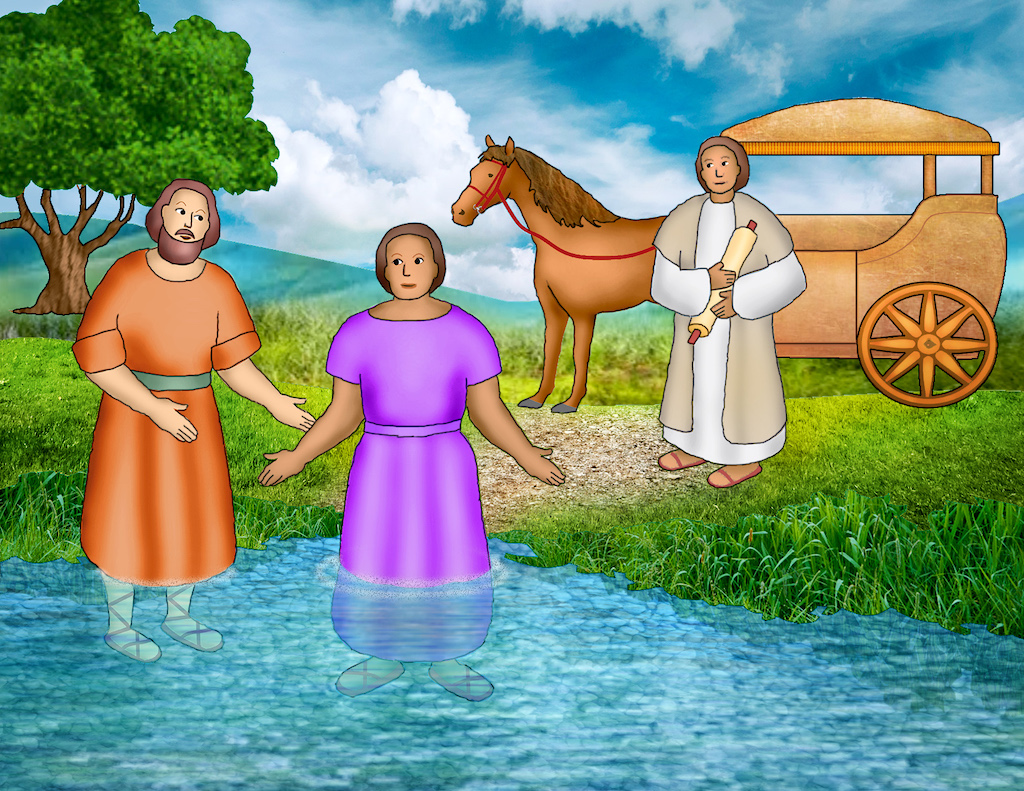One day, the angel of the Lord spoke to the apostle Philip.
“Get up and head south on the road that goes down from Jerusalem to Gaza, the desert route,” the angel told him.
Philip got up and set out.
At the same time, an Ethiopian man was worshipping in Jerusalem. He was an official of the Ethiopian queen’s court and was in charge of her entire treasury.
Once the Ethiopian man had finished worshipping, he set out for home by the same route Philip was taking.
As he journeyed toward home, the Ethiopian man stopped his chariot to read from the prophet Isaiah.
The Holy Spirit said to Philip, “Go and join up with that chariot.”
Philip ran up to the Ethiopian man and heard him reading aloud from the prophet Isaiah.
“Do you understand what you are reading?” Philip asked.
“How can I, unless someone instructs me?” the Ethiopian man replied as he invited Philip to sit in his chariot.
He had been reading this passage from Isaiah:
“Like a sheep he was led to the slaughter, and as a lamb before its shearer is silent, so he opened not his mouth. In his humiliation justice was denied him. Who will tell of his posterity? For his life is taken from the earth.”
“I beg you, about whom is the prophet saying this?” the Ethiopian man asked Philip. “About himself, or about someone else?”
Philip, beginning with the passage from Isaiah, proclaimed Jesus to him.
As they traveled along in the Ethiopian man’s chariot, they came to some water.
“Look, there is water,” the Ethiopian man said. “What is to prevent my being baptized?”
He ordered the chariot to stop. He and Philip both went into the water, and Philip baptized him.
When the men came out of the water, the Holy Spirit snatched Philip away, and the Ethiopian man saw him no more.
The Ethiopian man continued his journey home, rejoicing as he went.
Philip went to Azotus, and he went about proclaiming the good news to all the towns until he reached Caesarea.
READ MORE ABOUT IT:
Acts 8
Q&A
- What was the Ethiopian man reading?
- Who baptized the Ethiopian man?
TRIVIA: What was the Ethiopian queen also known as? (Hint: Acts 8:27)
Answer: The Candace
BIBLE ACCENT:
In the Old Testament, we can read about another Ethiopian man who listened to the words of a prophet.
In Jeremiah 38, we learn that some princes of Israel hated the prophet Jeremiah for preaching God’s message that Jerusalem would be captured by Babylon.
They wanted to kill Jeremiah, so they threw him into a muddy cistern.
Ebed-melech, an Ethiopian man who was a court official in the house of King Zedekiah of Israel, heard what was happening.
Ebed-melech went to the king, who was sitting at the Gate of Benjamin in Jerusalem.
“My lord king, these men have done wrong in all their treatment of Jeremiah the prophet, throwing him into the cistern. He will starve to death on the spot, for there is no more bread in the city,” he said.
“Take three men with you, and get Jeremiah the prophet out of the cistern before he dies,” the king replied.
The men rescued Jeremiah from the cistern, and the prophet remained in the court of the guard until Jerusalem was captured by Babylon, just as Jeremiah had preached.
Jeremiah gave Ebed-melech a message of comfort from God, who promised to deliver Ebed-melech from the Babylonians for trusting in him.
SPOTLIGHT ON THE SAINTS:
St. Mary Mazzarello
Mary Mazzarello was born into a peasant family in Italy in 1837. She worked long hours in the fields and vineyards, and she attended Mass frequently.
In 1860, members of a group she had joined were asked to nurse victims of typhoid fever. Mary took part and nearly died after becoming sick herself.
Her weakened health prevented her from doing farm work, so Mary opened a dressmaking business to create jobs for local girls. The venture was the beginning of the Salesian Sisters of St. John Bosco, which now has 1,400 houses in 54 countries.
Mary died in 1881, and we remember her on May 14.
PUZZLE:
Unscramble the letters in each word and arrange them to make a quotation from the children’s story.
ot giben thwa zapbedit si repnevt ym
Answers: to, being, what, baptized, is, prevent, my
What is to prevent my being baptized?

